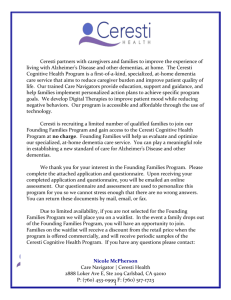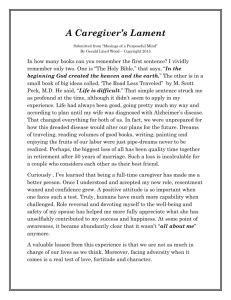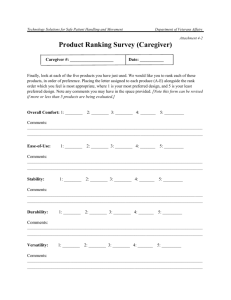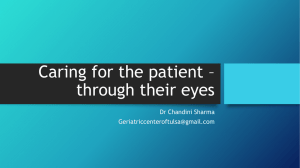Annual report
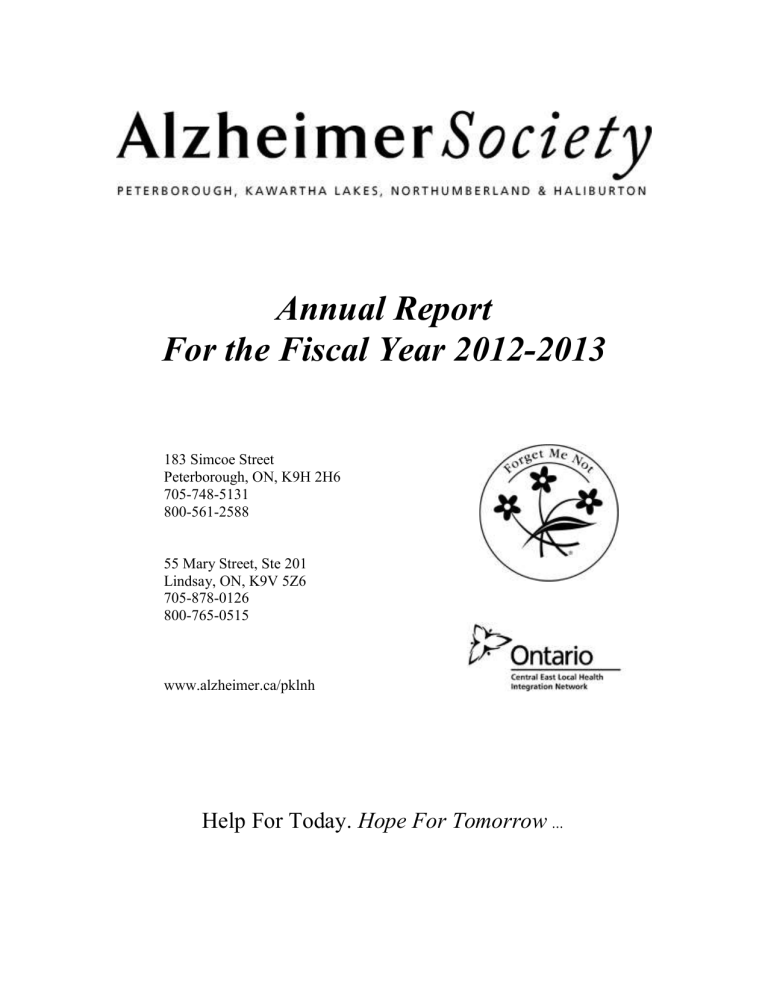
Annual Report
For the Fiscal Year 2012-2013
183 Simcoe Street
Peterborough, ON, K9H 2H6
705-748-5131
800-561-2588
55 Mary Street, Ste 201
Lindsay, ON, K9V 5Z6
705-878-0126
800-765-0515 www.alzheimer.ca/pklnh
Help For Today. Hope For Tomorrow
…
Alzheimer Society of Peterborough, Kawartha Lakes,
Northumberland and Haliburton
Vision: To be a leader in the Alzheimer movement and recognized by our community as an essential provider of dementia-related services and supports.
Mission: The Alzheimer Society is a community agency dedicated to improving the quality of life for persons with Alzheimer’s disease and related dementias, and their caregivers.
The Alzheimer Society wishes to thank the Staff and Residents of
Canterbury Gardens Retirement Residence, owned by AON Inc. We are grateful, once again, to have our Annual Meeting hosted by Canterbury
Gardens, who have provided us with space and refreshments at no cost to our organization. This form of support has been very helpful to ensuring our donated dollars are directed to where they are needed most, to our client services and programs. Thank you!
Table of Contents
Report of the President and Executive Director
Organizational Overview
Outcome-based and Client-focused Programs
Support Group Activities
Education Activities
Friendly Visiting Program
Volunteers
Fund Development and Donors
Partnerships
Recent Initiatives
On The Horizon
Program Statistics and Financials
Call to Action
Appendix One: Support Group Activities and Growth
Appendix Two: Education Activities and Growth
Appendix Three: Board of Directors 2012/13
Appendix Four: Staff Team 2012/13
Report of the President and Executive Director
It is with pleasure that we share this Annual Report with you. We are very proud of the activities and results of the past year. While the statistics indicate community need for our services continues to grow, we are also pleased with the increase in activities for our clients, and the quality of support they receive.
“See me, not my disease...” has been our education campaign theme for the past year. We continue to review our activities to ensure we remain clientfocused, ensuring our programs are designed to meet the needs of individuals living with dementia and their care partners.
While we continue to strive for an all-inclusive environment within our organization, we are also feeling the rewards of increased acceptance within the broader community. Our referral numbers are climbing from an increasing number of community partners, our support continues to be strong to help maintain manageable expenses, and our invitations to participate in program delivery and community-wide development are expanding.
Further, the knowledge and expertise acquired in the amalgamation process three years ago is now being tapped by other Societies to help further their search for long-term sustainability and service to those in need.
Please accept our appreciation to all of our stakeholders for your continued contributions. Whether you are a donor or financial supporter, a volunteer, a staff member, a community partner, or a client, please know that you have had a hand in providing support to individuals and their families traveling the dementia journey – thank you!
Colin Chambers David Webster
Executive Director President
“ One of the most touching quotes
I heard at the conference was from a geriatric specialist delivering a diagnosis … this disease will change your life, but it won’t change who you are, and the people who love you will always love you”
Organizational Overview
The clients of the Alzheimer Society include individuals affected by
Alzheimer’s disease and other dementias, and their caregivers, including those who are experiencing warning signs but have not yet received diagnosis. The Alzheimer Society also supports the educational needs of those who provide service to individuals with dementia, including staff at retirement and long-term care facilities, students in health-related programs, and other staff and volunteers from various community service agencies.
The Alzheimer Society provides ongoing information and support for clients, in both individual and group formats, in the following areas:
Understanding the dynamics of Alzheimer’s disease and other dementias, its symptoms and progression
Identifying support services (internal and external to AS)
Reducing caregiver stress
Navigating the health care system
Understanding options for care and transition to Long-Term Care
Understanding Long-Term Care options
Advanced care planning
Explaining dementia to children, youth and other family members
Understanding changes in the brain and in behaviours
Assisting with activities of daily living
Researching and advocacy
Safety for persons with dementia
Medic Alert® Safely Home® Programs
Friendly Visiting Program (Peterborough City and County only)
Step out Walking Program
Link to peer support within a safe environment
Information about abuse and how to avoid/end abuse
Understanding and adopting healthy brain strategies
Outcome-based and Client-focused Programs
While there is always a balance in terms of providing quality care and quantity care, we do anticipate the following outcomes from our support to our clients:
With early detection of dementia, our clients are provided an opportunity to adjust to the diagnosis and to participate actively in planning for their future; and are provided with an opportunity to remain engaged in their community for a longer period of time
Our clients will be more educated about healthy living that could result in a delay of the onset of the disease; earlier diagnosis translates to earlier access, and earlier access translates to early diagnosis, with the potential to slow down the development and progression of the disease through an increased connection to community resources
Our caregivers will be provided with education and skills that will support them through their struggles with the overwhelming emotional and financial hardships of providing care
Our caregivers will be better able to cope with their responsibilities which translates to being able to care for their loved ones, in their home environments, for a longer period of time
Our clients will be educated about, and supported in obtaining access to, community support services within the health care system, that can help to alleviate pressures and delay the need for admission to a long-term care home
“I no longer hide at home.
I’m back visiting people again, family and friends …”
See me, not my disease. Let’s talk about dementia.
He’s having a senior’s moment. She’s lost her marbles. It must be old timer’s disease. He’s getting senile.
Sound familiar? Common statements like these seem harmless. But they contribute to the shame, embarrassment and exclusion that people with dementia often face in their community, at work and even among family and friends. Stereotypes about the disease are what prevent people from getting the help they need or disclosing their diagnosis, and stereotypes stop others from taking the disease seriously.
“Dementia really challenges the values we hold as a society and what it means to be human” says Mary Schulz, Director of Education at the
Alzheimer Society of Canada. “We need to stop avoiding this disease and rethink how we interact with people with dementia. Only by understanding the disease and talking more openly about it, can we face our own fears and support individuals and families living with dementia.”
The reality is that dementia, including Alzheimer’s disease, is a degenerative brain disorder. It’s no one’s fault and it doesn’t define the person who has it.
People with dementia are the people they always were. It’s time we start looking at this disease differently. It’s time to change the conversation – and it starts with you.
Support Group Activities
Support groups are held monthly, have consistent formats while still remaining flexible for local community needs:
Changes – a group for persons with early-stage dementia who are able to attend independently;
Milestones – a group for persons with middle-stage dementia whose care partners need to be available (in close proximity);
Caregiver Support Group – a group for caregivers of individuals with dementia;
Activity Club – a session for persons with dementia and/or caregivers, with a focus on healthy brain stimulation activities
With the conscious effort made to ensure services are available equitably to all residents throughout the 4 counties, with the decision to provide increased services to individuals living with dementia, and with the increase in the volume of individuals being referred to the organization, the volume and location of support groups has changed dramatically.
“Together, all of these women have become my
Rock of Gilbraltar. I owe them a huge debt of gratitude for getting me through this difficult passage”
Education Activities
The Society provides educational support to individuals and families, professionals and community partners – anyone directly or indirectly affected by Alzheimer’s disease and other dementias. While most impact is felt by programs being delivered directly to those living with dementia and their care partners, the organization continues its commitment to indirectly supporting those individuals and families by providing education to such community partners, professional and non-professional caregivers, that include long term care homes, retirement homes, college and university programs and community groups.
One program has seen significant increase in activity – the First Link®
Learning Series was developed to help individuals and families move through the Alzheimer journey. Our organization focused on simultaneously increasing the number of programs for those active in the dementia journey, and ensuring availability in local communities throughout our territory. The following identifies several existing programs:
First Steps : a series to help newly diagnosed individuals with dementia and their caregivers understand the diagnosis and the changes they experience
Next Steps: a series offering family members and friends caring for individuals diagnosed with dementia an overview and further information about supporting a loved on through the dementia journey
Care Essentials : a series focusing on problem solving strategies, approaches for communication and available avenues for support
Options for Care : a series helping family members and friends evaluate their current and future caregiving needs
Care in the Later Stages : a series helping family members and friends explore what to expect in the later stages of dementia, including identifying their own needs
“My husband, son and daughter went with me to First Steps – they left understanding how I feel and what I can do”
Behavioural Supports Ontario (BSO):
In a joint initiative between Alzheimer Society Ontario (ASO) and the
Ministry of Health, delivered through the LHINs, an increased effort has been made to educate and provide tools to staff working in both long term care homes as well as community agencies. While each LHIN has implemented this program differently, the intended end-recipients of this activity are those individuals who are active in caring for difficult-to-manage behaviours tied to memory loss and other mental health diagnoses. Our
Public Education staff have been active in delivering sessions through this initiative, and directly as requested by various homes, in the following programs:
U-First : training and education program designed for unregulated health provides who provide care for persons with Alzheimer’s disease and other dementias
GPA (Gentle Persuasive Approaches in Dementia Care): education for long term care and retirement home staff in strategies for dealing with responsive and challenging behaviours
Friendly Visiting Program
The Society provides this program within Peterborough City and County.
Volunteer companions are matched with individuals living with dementia who are still at home as a way to maintain social interaction throughout the community. While the program is designed for those living with dementia, it also supports the caregivers by providing some time to do other activities they need or want to do.
This past year, a pilot program was completed. The Step Out Walking Club
(SOWC) has proven to be a great success. Within the Friendly Visiting
Program portfolio, volunteers are matched with individuals living with memory loss, to take part in weekly walks throughout the community. This group of 8-12 people stroll through parks for exercise, socialization and cognitive stimulation. Everyone looks forward to their next exploration!
With the successful pilot, we hope to launch more clubs in other communities.
Volunteers
Recognizing the only way we can hope to meet future needs is by accepting volunteers as equal partners in our operations, we remain focused on increasing our complement of volunteers active at all levels of the organization.
Our Volunteer Group Facilitators have assumed leadership roles in many of our support groups, providing quality engagement of clients in a group setting, allowing our Client (staff) Coordinators to focus more on meeting individual client needs.
We have piloted a new role,
Volunteer Client Callers, and with its success, will be recruiting more members to assist with three and sixmonth follow-up calls with our clients who don’t require intensive support.
Our Step Out Walking Club Leader and Guide has taken control over that activity, ensuring that all participants have an interesting experience and a planned walking route each week.
Volunteer Hours to the Organization:
2010/11
2011/12
2012/13
1981 hours
3072 hours
3891 hours
Fund Development and Donors
We are forever grateful to our individual, community and corporate donors and supporters. Whether it is in the form of a donation, sponsorship or giftin-kind, all contributions help us close the gap between the need for our
Milestone Bread in Cobourg services and the ability for us to meet those needs.
Our Signature Events continue to grow in their success, including our Walk for
Memories®, our Coffee Breaks® and our
Tag Days. This past year saw the return of a Walk in Northumberland County, and we experienced growth in both
Peterborough and Lindsay walks. Our Tag
Days are seeing increased volunteer support in the rural communities, bringing greater success.
supports Coffee Break
We remain very grateful to our corporate supporters. Scotia Bank and
Stoneguide Realty have provided us with yet another successful Golf
Tournament. Bulk Barns have joined to support us in Coffee Break® events. And we continue to receive support from community events including but not limited to the Dave
Duvall Golf Tournament, MPAC
Dress Down Days, Centennial Place
Barbeque and local musicians performing at the Forget-Me-Not
Country for a Cause at the Montreal
House.
Anand Shah from Shoppers
Drugmart in Bobcaygeon’s
Tree for Life Program
And we continue to experience growth in the number and commitment levels of our individual donors – thank you!
Partnerships
With growing demands to provide more service without corresponding increase in government funding, it is critical for us to seek opportunities to engage with community partners in the delivery of service.
We need and want to acknowledge all of the partners who help us to ensure we can maintain a focus on meeting the needs of our clients. This support comes in many forms, from hosting events, hosting regular support groups, sharing space for meetings and client sessions, referral of clients between agencies- the list goes on, and is not limited to the following:
Relationships are established for referrals to and from the AS, including 32 physicians, three dementia specialists, Geriatric
Emergency Management (GEM) staff at three hospitals,
Psychiatric Assessment Services for Elderly (PASE), Geriatric
Assessment Intervention Network (GAIN), two memory clinics, and various community services (long term care homes, VON day programs, Hospices, Community Care Access Centre, Community
Care agencies, and other community service providers)
Relationships are established with 47 long term care homes and retirement homes, that include referrals, staff training, client tours, client support for transitioning to facilities, space for support groups and client and organizational meetings
Relationships established with organizations (long term care homes, retirement homes, health centre, family health teams, community agencies, service clubs and churches) to provide space for individual and group client sessions
Relationships with community partners in networks to help ensure consistent and directed services related to seniors care
Recent Program-Related Initiatives
The Society, its staff and volunteers, continue to seek opportunities to develop and enhance what we do and how we do it. Several activities and initiatives have recently been piloted, are being piloted, or have been initiated:
In response to concerns from caregivers not being able to attend support groups with their responsibilities to their loved ones requiring their attention, several support groups are now being realigned to occur at the same time as support groups for those with dementia (so both the caregiver and the person with dementia can attend different groups at the same time)
Also in response to caregivers having difficulty in attending events, the Society has now started to provide respite programs for those living with dementia so that their care partners can attend educational events
The Society has expanded their (previous) caregiver annual picnics to now be inclusive of all clients, so both those living with dementia and their caregivers can attend
The Society has just approved, and has held the inaugural meeting, of a Client Advisory Committee with a membership of individuals living with dementia, as a standing committee reporting to the
Board of Directors
The Society has developed a template to provide direction to caregivers, who at the end of their involvement with our agency, can establish “social groups” to continue to meet and develop relationships with other (former) caregivers
In early development, the Society is exploring the possibility of developing a cooking program for male caregivers, acknowledging that men aren’t as comfortable in the traditional support group format, who can meet through an activity, that will also help them develop skills they may not have
A new ASO/ASC program is being introduced that will help provide increased safety for individuals with dementia, to help in the location of those who may wander
A new program, Step Out Walking Club (SOWC) designed to provide those living with dementia an opportunity to increase involvement in healthy body and brain exercise, has been
successfully piloted and is now being introduced in other communities
Increased engagement of volunteers in the delivery of programs: development of a volunteer training matrix to provide more efficient delivery of orientation and development activities; volunteer partners engaged as Support Group Facilitators, Public
Education Ambassadors, Client Advisory Committee members,
Step Out Walking Club buddies, and Volunteer Client Callers
Continuation of training and implementation of Privacy
Legislation
Continuation of development of policies and procedures
Initiation of a Political Engagement Strategy
Our annual MacQaurrie Educational Series continued this past
January with 3 presentations across our area, “Laughter Yoga” and
“Brain Gym®”
The Intergenerational Program continues in Lindsay, linking youth with residents with dementia in a long term care home for social activities
In partnership with ECHO: Improving Women’s Health in Ontario, a vision for programming, “Caregiver’s Hope”, was developed by a number of caregivers
The local Society continues to support the advancement of dementia care through a scholarship program at Trent University, recognizing a 4 th year student who has demonstrated a focus on dementia
Following on the recognition by the Lindsay and District Chamber of Commerce at their Business Excellence Awards as winner for
Volunteerism and runner up for Non-Profit, the Peterborough
Chamber of Commerce recognized our organization as runner-up for Non-Profit at their Business Excellence Event.
On the Horizon
In looking ahead, there are a number of opportunities and pressures that exist that may or will have an influence on our organization:
Development and hosting of a conference designed specifically for volunteers
Implementation of changes related to the new Not-for-Profit Act
Implementation of an Accreditation Review
Accessibility Legislation Compliance
Development of a Risk Management Program
Hosting a Changing Melody Conference (a conference developed and organized by individuals with dementia)
And as we continue forward, several themes remain constant:
We need to close the current gap between those who live with dementia and those receiving our support
We need to prepare for the pending “tidal wave” of clients as the baby boomer generation ages
We need to address gaps in service for individuals and families not currently served by other organizations
Statistics
Report of First Link® Activities to the Central East LHIN:
Number of referrals from professional sources, and activity for those individuals within the dates of that fiscal year.
Description
Number of Referrals
Budget 2012/13 Actual 2012/13
300 856
360 1002 Number of Contacts with Referrals
Number of Hours with
Referrals
210 599
Report of Active Clients recorded for Internal Use:
Number of active clients, registered that day (individuals with dementia and caregivers) … NB. excludes any non-registered service recipients
March 31 st March 31 st March 31 st March 31 st
2010 clients 2011 clients 2012 clients 2013 clients
334 474 775 676 Peterborough
County
City of Kawartha
Lakes
152 389 513 657
Northumberland
County
Other
84
Haliburton County 5
147
169
47
93
240
99
130
268
127
133
Total 721 1172 1757 1861
Report of Unique Individuals Served reported to the Ministry of Health
LTC:
Unique Clients Served Within Fiscal Year (all 4 Counties)
2009/10
822
2010/11
1842
2011/12
2274
2012/13
2782
Financials
Meeting funding obligations continues to be a concern for the Society for a number of reasons. The Ministry of Health through the LHIN is the major funder for our programs, and represents more than 2/3 of our current funding. This poses a risk in terms of having diversified funding sources, and also poses restrictions based on their directions for service provision and requirements for reporting. While local funding efforts have been increasing, the Society needs to continue to a focus to attract new dollars in greater amounts.
2009/10 2010/11 2011/12
650605
181220
609656
171116
2012/13 (preaudit)
617992
202705
Govt Funds 611520
Local
Fundraising
149766
105869 Local Misc
Funds
Total
Revenue
866555
25870
857695
37258
818030
56119
876810
Total
Expenses
Balance
816541 960016 827391 889491
50314 (2321) (9361) (12675)
NB: 2009/10 represents combined reports (pre-amalgamation) of the
(former) Alzheimer Society of Peterborough and Area and the (former)
Alzheimer Society of Kawartha Lakes.
Local Fundraising (Net)
Source 2009/10
Actual
71672
2010/11
Actual
2011/12
Actual
2012/13
Actual
91808 93814 104516 Public Support:
Major gifts,
Memorial,
General ,
Unreceipted donations,
Planned giving,
Caregiver kitty,
Board donations,
Foundations,
Service clubs
Fundraising:
Coffee Break,
Walk,
Tag Days,
Misc
Third Party Events:
ScotiaBank/Stoneguide Realty
Golf, Other
Total:
Putting Together the Numbers:
59229
18795
149766
55352
34060
181220
54529
22773
171116
73603
24586
202705
Clients Served
Learning Series
Support Groups
FTE Total
Govt Funding
Local Funding
Total Revenues
2009/10
822
8
16
13.8
611,520
255,635
866,555
2010/11
1842
9
650,605
207,090
857,695
2011/12
2274
20
609,656
208,374
818,030
2012/13
2782
17
45
13.6
617,992
258,824
876,816
Total Expenditures 813,241 860,016 827,391 889,491
NB. The Central East LHIN has recently provided notice of a temporary increase in Client Coordinator of 0.7 FTE for 2013/14.
A Call to Action
The “tide” continues to come our way, with more and more people being diagnosed, and expected to be diagnosed over the next several years. As you know, the solution is a simple one that relies on successful engagement with a team of donors and volunteers.
Volunteers help us to build our capacity to deliver more services without incurring increased cost. We are actively seeking volunteers to help in all levels of the organization, including on our Board of Directors, within program delivery activities including volunteer client callers, volunteer group facilitators, Step Out Walking Club and Friendly Visitor companions, education ambassadors, various fundraising event and leadership roles, and with our administrative office support functions.
However, the fairly simple formula is that donations translate to people being served: anyone can be a donor, any amount is valuable, and donations made locally will be used locally.
Options to show your support include:
You can make a one-time donation or any number of smaller donations
You can join a monthly giving program, where your donation is removed on your behalf from your credit card account
You can make a “major gift” of a significant amount , and can see your gift in action
You can make a “planned gift” of a significant amount as part of your estate
There are many tax advantages to making a major or planned gift that your financial planner is best equipped to help you with
You can make a memorial gift in the name of someone who dies
You can designate the local Alzheimer Society as a charity of choice for memorial donations
You can host a party for friends and family – “instead of a birthday/anniversary/wedding/holiday gift, please make a donation to your local Alzheimer Society”
You can collect Canadian Tire money for the local Society to use
You can empty coins from your pocket at the end of the day, keep it in a jar until it’s full, and then bring it in as a donation
You can host third party events, where proceeds from your event are donated to the local Society
You can approach your workplace to see if the business has a matching donation program, where your donation to charity is matched by them; and/or if they have a volunteer recognition program, where your volunteer contributions are matched by them with a financial donation
“I get the feeling from one of the speakers that she’s not giving up until the end.
She’s going to keep doing what’s positive. I really appreciated that.”
The views expressed in this Annual Report are the views of the local Alzheimer Society, and do not necessarily reflect those of the Central East LHIN of the Government of Ontario. The Alzheimer Society is appreciative for the funding we received from the Ministry of Health through the Central East LHIN.
Appendix One: Support Group Activities and Growth
Group Activity Before March 2010
Peterborough Brown Bag Support Group Peterborough Memory Makers Group
Lakefield Caregiver Support Group Millbrook Caregiver Support Group
Cobourg Caregiver Support Group Port Hope Caregiver Support Group
Campbellford Caregiver Support Group Fenelon Falls Caregiver Support Group
Lindsay Caregiver Support Group “A”
Lindsay Caregiver Support Group “C”
Lindsay Caregiver Support Group “B”
Bobcaygeon Caregiver Support Group
Bobcaygeon Changes Support Group Kirkfield Caregiver Support Group
Kinmount Caregiver Support Group
Haliburton Caregiver Support Group (contracted through another agency)
Group Activity at April 2013
Ptbo Activity Club “A”
Ptbo Caregiver Support Group “A”
Ptbo Activity Club “B”
Ptbo Caregiver Support Group “B”
Ptbo Caregiver Support Group “C”
Ptbo Changes “A”
Ptbo Activity Club (PWD)
Ptbo Memory Makers “B”
Ptbo Caregiver Support Group “D”
Ptbo Milestones Group “A”
Ptbo Memory Makers “A”
Lakefield Caregiver Support Group “A”
Lakefield Caregiver Support Group “B” Apsley – Caregiver Support Group
Apsley Milestone/Changes Group Millbrook Caregiver Support Group
Colborne Caregiver Support Group
Cobourg Activity Club
Cobourg Caregiver Support Group
Port Hope Caregiver Support Group
Campbellford Changes Support Group Campbellford Caregiver Support Group
Fenelon Falls Caregiver Support Group “A” Fenelon Falls Caregiver Support Group “B”
Fenelon Caregiver Support Group “C”
Fenelon Falls Milestones Support Group
Fenelon Falls Changes Support Group Minden Caregiver Support Group
Haliburton Caregiver Support Group “A” Haliburton Caregiver Support Group “B”
Lindsay Activity Group
Lindsay Caregiver Support Group “B”
Lindsay Caregiver Support Group “D”
Lindsay Changes Support Group “A”
Lindsay Caregiver Support Group “A”
Lindsay Caregiver Support Group “C”
Lindsay Milestones Support Group
Lindsay Changes Support Group “B”
Bobcaygeon Caregiver Support Group Bobcaygeon Changes Support Group
Haliburton Changes/Milestones Support Group
Ptbo Caregiver Support Group “E” (coming spring 2013)
Ptbo Changes/Milestone Group “B” (coming spring 2013)
Cobourg Changes/ Milestones (coming spring 2013)
Port Hope Changes/Milestones (coming spring 2013)
Appendix Two: Learning Series Activities and Growth
Education Series 2009/10 (8 sessions):
First Steps, Peterborough (x2)
Lindsay (x3)
Port Hope
Fenelon Falls
Next Steps , Fenelon Falls
Education Series 2012/13 (17 sessions):
First Steps, Colborne
Peterborough (x3)
Bobcaygeon
Campbellford
Cobourg
Next Steps, Fenelon Falls
Care Essentials, Bobcaygeon
Campbellford
Omemee
Lindsay
Millbrook
Lakefield
Options for Care , Haliburton
Peterborough
Care in Later Stages , Peterborough
Appendix Three: Board of Directors 2012/13
President: Colin Chambers
Past President: Bob Geddes
Vice President: Dr. Robert Kyle
Vice President: Michelle Tabor
Secretary: Marg Plaunt
Treasurer: Tim Nicholls
Directors: Marilyn Gandy
Joyce Ferguson
Ray Johnson
Donna MacDonald
Joan McCormick
Dorothy Owens
Judy Matte-Thompson
Carol Urbach
Murad Younis
Appendix Four: Staff Team 2012/13
Program Staff:
Anne Marie Peters
Bonnie Fitzgerald
Carolyn Hemminger
Diana Primavesi
Jennifer Stubbert
Pat Finkle
Susan Barringer
Sylvianne Young
Betty Batten
Lisa Morasse
Sarah Cook
Resource Development:
Betty Batten
Debra McCarthy
Administration:
Melinda Ferguson
Heather McWilliam
Nancy Bozak
David Webster
Client Support Coordinator
Client Support Coordinator
Client Support Coordinator
Client Support Coordinator
Client Support Coordinator
Client Support Coordinator
Client Support Coordinator
Client Support Coordinator
Friendly Visiting Coordinator
Public Education Coordinator
Public Education Coordinator
Volunteer Resources Coordinator
Fund Development Coordinator
Bookkeeper
Administrative Assistant (April 2012 –
January 2013)
Administrative Assistant (February 2013 - )
Executive Director

